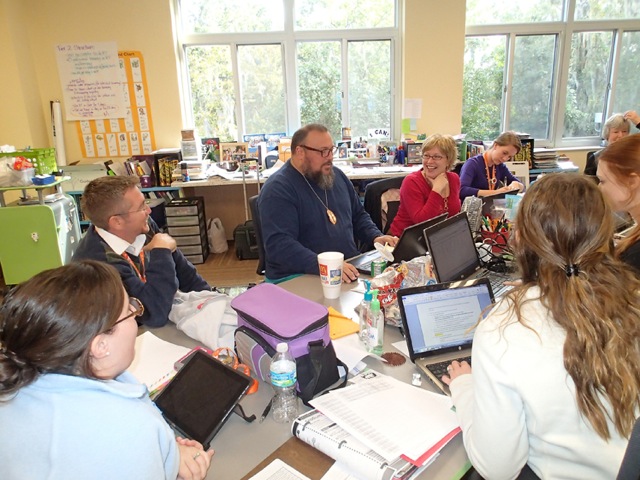P.K. Yonge, COE professor team up to align math curriculum with Common Core standards

UF mathematics education associate professor Tim Jacobbe (second from left) joins P.K. Yonge teachers to discuss the new math curriculum implementation process.
As Florida schools prepare for the official implementation of the Common Core standards next school year, UF mathematics education associate professor Tim Jacobbe and P.K. Yonge, UF’s K-12 developmental research school, have been teaming up since 2009 to ensure the school is ready to meet the more rigid math standards. With Jacobbe’s help, P.K. Yonge implemented a new math curriculum for the elementary grades for the 2013-2014 school year.
Jacobbe has facilitated faculty discussions and needs assessments to determine how to align teaching practices at P.K. Yonge with the rigor demanded by the Common Core standards for math. He also led a weeklong professional learning workshop for K-8 math teachers, focusing on deepening their content knowledge and grasp of the math practice standards.
“Tim had such background in what P. K. Yonge was doing. He led discussions about curriculum adoption and supported P. K. Yonge’s next steps. All of this laid incredible groundwork for moving through the adoption process” said Marisa Stukey, P.K. Yonge’s program development and outreach specialist.
The new adopted math curriculum at P.K. Yonge strengthens students’ perseverance, strategies and reasoning skills specifically related to problem solving. These teaching practice standards had not been explicitly addressed before in P.K. Yonge’s curriculum or in the teaching of math, Stukey said.
“Math is about thinking,” Jacobbe said. “Math is about problem solving, not just knowing math facts. Just knowing facts won’t help students succeed in life.”
In the past, P.K. Yonge’s overall math achievement has been high on standardized tests like the FCAT. These tests, however, assess understanding of basic math concepts, rather than measuring conceptual understanding of more complex math, which is demanded by the Common Core.
Jacobbe will continue making weekly visits to P.K. Yonge to study student work before and during the new curriculum in order to understand how to further help teachers and students gain a deeper conceptual understanding of math. He is working with school math teachers faculty to develop a new middle school math curriculum for the 2014-2015 school year.
“It’s important to make sure we have a cohesive plan between our elementary and middle schools,” Jacobbe said. “The P.K. Yonge teachers are tremendous professionals. The foundation of our work has been laid by good early curriculum decisions and is only possible because the teachers are willing to take on the challenge of helping the learners of today be successful in math in a new way.”




